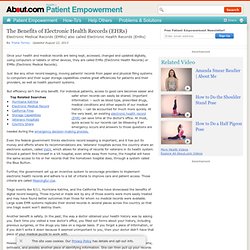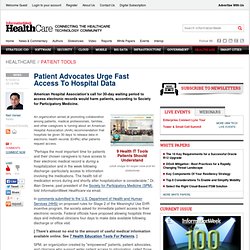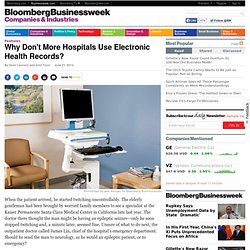

Electronic Medical Records - Benefits of Electronic Medical Records. Once your health and medical records are being kept, accessed, changed and updated digitally, using computers or tablets or other devices, they are called EHRs (Electronic Health Records) or EMRs (Electronic Medical Records).

Just like any other record keeping, moving patients' records from paper and physical filing systems to computers and their super storage capabilities creates great efficiencies for patients and their providers, as well as health payment systems. But efficiency isn't the only benefit. For individual patients, access to good care becomes easier and safer when records can easily be shared. Important information -- such as blood type, prescribed drugs, medical conditions and other aspects of our medical history -- can be accounted for much more quickly.
At the very least, an existing electronic health record (EHR) can save time at the doctor's office. Another benefit is safety. Patients Benefit from Electronic Medical Records - IHACares. Patient Advocates Urge Fast Access To Hospital Data - Healthcare - The Patient. American Hospital Association's call for 30-day waiting period to access electronic records would harm patients, according to Society for Participatory Medicine. 9 Health IT Tools Patients Should Understand (click image for larger view and for slideshow) An organization aimed at promoting collaboration among patients, medical professionals, families, and other caregivers is fuming about an American Hospital Association (AHA) recommendation that hospitals be given 30 days to release data in electronic health records (EHRs) after patients request access.

"Perhaps the most important time for patients and their chosen caregivers to have access to their electronic medical record is during a hospitalization and in the week following discharge--particularly access to information involving the medications. The health toll of medication errors during and shortly after hospitalization is considerable," Dr.
In comments submitted to the U.S. More Insights. More Advantages of Electronic Medical Records for PT Practitioners. Why Don't More Hospitals Use Electronic Health Records? When the patient arrived, he started twitching uncontrollably.

The elderly gentleman had been brought by worried family members to see a specialist at the Kaiser Permanente Santa Clara Medical Center in California late last year. The doctor there thought the man might be having an epileptic seizure—only he soon stopped twitching and, a minute later, seemed fine. Unsure of what to do next, the outpatient doctor called James Lin, chief of the hospital’s emergency department. Should he send the man to neurology, as he would an epileptic patient, or to emergency? Lin, a fast-talking 38-year-old with brush-cut hair and freckles, had his colleague wait while he looked up the patient’s records on the hospital’s electronic health record (EHR) system. Jake Stangel for Bloomberg BusinessweekLin finds EHR data invaluable in the ER Outcomes like these, Lin says, are precisely what Kaiser’s EHR system was designed for.
In the U.S., things are different. The pace of change has quickened, however. Productivity gains from health IT must await bigger health system changes. Public release date: 13-Jun-2012 [ Print | E-mail Share ] [ Close Window ] Contact: Warren Robakrobak@rand.org 310-451-6913RAND Corporation Productivity gains that can be achieved by widely adopting health information technology are likely to come from the reengineering of health care and may require new measurement tools to accurately gauge their impact, according to a new analysis from RAND Corporation researchers.

While debate remains about whether electronic health records and other health IT investments will deliver promised improvements, RAND researchers suggest that existing administrative data used to measure productivity gains may be unable to detect the effects of health IT. Their analysis is outlined in a commentary published in the June 14 edition of the New England Journal of Medicine. The U.S. government is investing $27 billion to encourage adoption of health information technology under the Health Information Technology for Economic and Clinical Health Act of 2009.